Garden Maintenance in Ealing
Introduction to Garden Maintenance
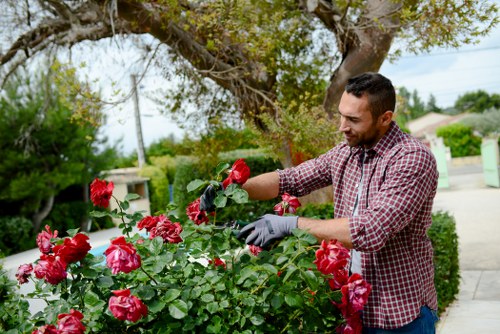
Maintaining a beautiful garden in Ealing requires dedication, knowledge, and the right set of tools. Whether you have a sprawling backyard or a modest balcony garden, proper upkeep ensures that your green space remains vibrant and healthy throughout the year.
Garden maintenance involves a variety of tasks, including pruning, weeding, watering, and pest control. Each of these activities plays a crucial role in keeping your plants thriving and your garden aesthetically pleasing.
In this article, we'll explore the essential aspects of garden maintenance in Ealing, offering tips and insights to help you achieve a lush and well-maintained garden.
Seasonal Garden Care
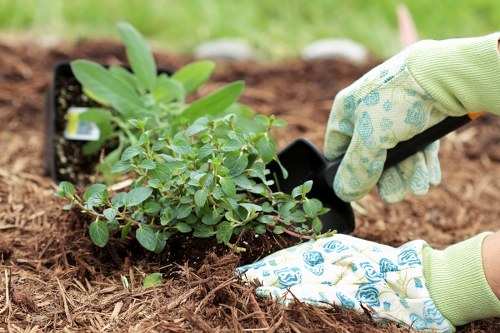
Different seasons bring unique challenges and opportunities for garden maintenance. Adapting your gardening practices to the changing weather conditions in Ealing is key to ensuring year-round plant health.
Spring: As the weather warms up, it's time to prepare your garden for growth. This includes clearing away winter debris, pruning dead branches, and planting new seeds.
Summer: Hot and dry conditions require diligent watering and pest management. Mulching can help retain soil moisture and regulate temperature.
Essential Garden Maintenance Tasks
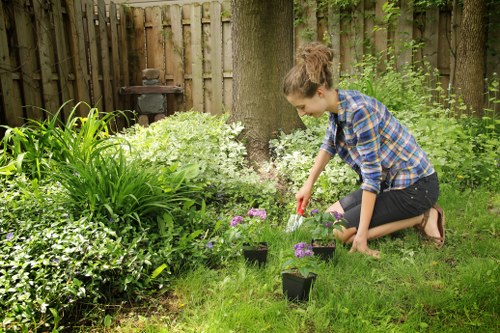
Consistent garden maintenance involves several critical tasks that contribute to the overall health and appearance of your garden.
Pruning and Trimming
Regular pruning helps maintain the shape of your plants and encourages healthy growth. Remove any dead or diseased branches to prevent the spread of pests.
Weeding
Weeds compete with your plants for nutrients and water. Regular weeding ensures that your garden plants receive the resources they need to thrive.
Watering
Proper watering is essential, especially during the dry summer months. Install an irrigation system or water your plants early in the morning to reduce evaporation.
Pest and Disease Management
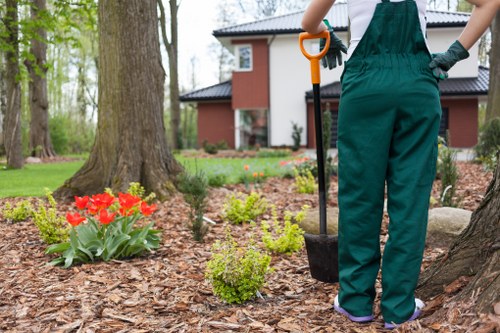
Protecting your garden from pests and diseases is a critical aspect of maintenance. Implementing integrated pest management strategies can help minimize the use of harmful chemicals.
- Natural Remedies: Use neem oil or insecticidal soaps to combat common garden pests.
- Beneficial Insects: Introduce ladybugs and other beneficial insects that prey on harmful pests.
- Regular Inspections: Frequently inspect your plants for signs of pests or diseases to catch issues early.
Soil Health
Healthy soil is the foundation of a thriving garden. Test your soil regularly and amend it with compost or organic matter to improve fertility and structure.
Choosing the Right Plants
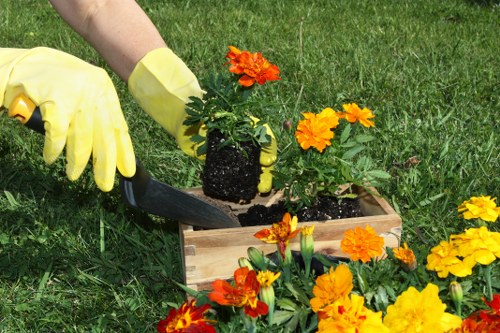
Selecting plants that are well-suited to Ealing's climate and soil conditions can significantly reduce maintenance efforts. Opt for native species that are adapted to the local environment and resistant to common pests.
Perennials vs. Annuals
Perennials return year after year, providing long-term beauty with minimal replanting. Annuals, while often more colorful, require more frequent planting and care.
Flowering Plants
Incorporate a variety of flowering plants to ensure continuous blooms throughout the growing season. Choose plants with different bloom times to maintain visual interest.
Lawn Care
A well-maintained lawn enhances the overall appeal of your garden. Regular mowing, aeration, and fertilization are essential for a healthy lawn.
- Mowing: Keep your grass at the optimal height to promote strong root growth and prevent weed invasion.
- Aeration: Aerate your lawn to improve soil aeration and water infiltration.
- Fertilization: Apply appropriate fertilizers to provide essential nutrients to your grass.
Grass Types
Choose grass varieties that thrive in Ealing's climate. Cool-season grasses like fescue and ryegrass are ideal for the region.
Hardscaping and Garden Structures
Incorporating hardscaping elements like patios, walkways, and fencing can add both functionality and aesthetic appeal to your garden.
Patios and Walkways
These structures provide designated areas for outdoor activities and help organize the layout of your garden.
Fencing
Fences offer privacy and define the boundaries of your garden. Choose materials that complement your garden's style.
Retaining Walls
Retaining walls can prevent soil erosion and create terraces for planting in sloped gardens.
Garden Tools and Equipment
Having the right tools can make garden maintenance tasks easier and more efficient.
- Pruners and Shears: Essential for trimming and shaping plants.
- Rakes: Useful for clearing debris and leveling soil.
- Watering Systems: Install hoses, sprinklers, or drip irrigation systems for effective watering.
Tool Maintenance
Regularly clean and sharpen your garden tools to ensure they remain in good working condition.
Hiring Professional Garden Maintenance Services
While DIY garden maintenance is feasible, hiring professional services can save time and ensure high-quality results. Professional gardeners in Ealing offer a range of services tailored to your garden's specific needs.
Benefits of Professional Services
- Expertise: Professionals have the knowledge and experience to handle various garden maintenance tasks effectively.
- Time-Saving: Outsourcing maintenance frees up your time for other activities.
- Customized Care: Tailored maintenance plans address the unique requirements of your garden.
Choosing the Right Service Provider
When selecting a garden maintenance service in Ealing, consider factors such as reputation, range of services, pricing, and customer reviews.
Sustainable Gardening Practices
Adopting sustainable gardening practices not only benefits the environment but also enhances the health and resilience of your garden.
Composting
Composting kitchen and garden waste enriches the soil with essential nutrients, reducing the need for chemical fertilizers.
Rainwater Harvesting
Collecting rainwater for irrigation conserves water and ensures your plants receive natural, chemical-free hydration.
Organic Gardening
Using organic methods for pest control and fertilization promotes a healthier garden ecosystem.
Gardening Tips for Ealing Residents
Implementing these practical tips can help you maintain a thriving garden in Ealing:
- Plan Your Garden Layout: Design your garden layout to optimize space and plant placement.
- Regular Maintenance: Schedule regular maintenance tasks to keep your garden in top condition.
- Educate Yourself: Stay informed about best gardening practices and adapt them to your garden's needs.
- Stay Consistent: Consistency is key to successful garden maintenance. Stick to a routine to achieve the best results.
Utilize Local Resources
Take advantage of local gardening clubs, workshops, and resources in Ealing to enhance your gardening knowledge and skills.
Conclusion

Effective garden maintenance in Ealing involves a combination of regular care, knowledgeable practices, and the right tools. By understanding the unique needs of your garden and implementing the strategies outlined in this article, you can create a beautiful and sustainable outdoor space.
Whether you choose to maintain your garden yourself or hire professional services, the key is to remain dedicated and proactive in your approach. A well-maintained garden not only enhances the beauty of your home but also provides a serene environment for relaxation and enjoyment.
Contact us today to learn more about our garden maintenance services in Ealing and take the first step towards achieving your dream garden.

